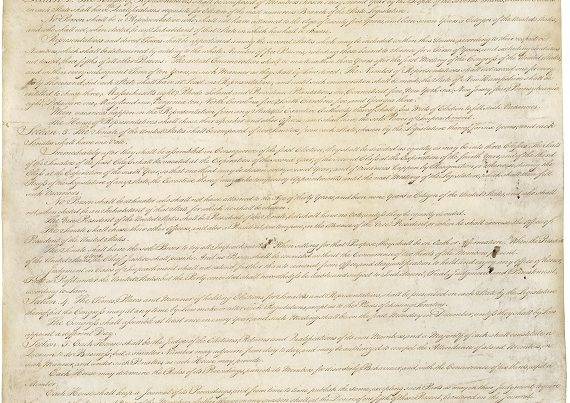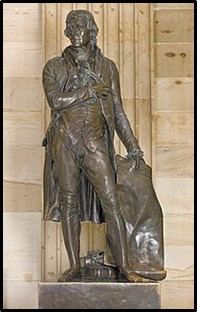
“Everyone should do all in his power to collect and disseminate the truth, in the hope that it may find a place in history and descend to posterity. History is not the relation of campaigns and battles and generals or other individuals, but that which shows the principles for which the South contended and which justified her struggle for those principles.” ~ Gen. Robert E. Lee
“The principle for which we contend is bound to reassert itself, though it may be at another time and in another form.” President Jefferson Davis, C.S.A.
Most people are familiar with that terrible and bloody conflict wherein a great deal more died than men and women, as “the Civil War”, but is that name accurate or even appropriate? The definition of a “civil war” is as follows: a war between opposing groups within a nation for the control of that nation.
Some more recent definitions omit the second phrase of the above definition referring simply to a “war between opposing groups within a nation,” but that is misleading, even mendacious. The recognized meaning of a civil war has always been one in which differing factions strive for control of a single nation in order to rule. The war between King Charles I and Oliver Cromwell was truly a “civil war” in that both sides strove by war to rule England. The war between the Stuart kings and the line of Hanover was also a “civil war” for the same reason. On the other hand, the wars between the British and the Irish, Scots and Welsh were not “civil wars” because though the British sought to rule Ireland, Scotland and Wales, the peoples of those nations had no designs upon the British throne – they simply wished to be left alone in peace and freedom.
The war that took place on the North American continent between 1861 and 1865 (although that only encompasses four years of what was in fact a much longer struggle) was akin to the latter rather than the former situation. The States of the South did not wish to rule the Union, they merely wished to leave it and hence, the war cannot be truthfully called a “civil war.” Yet, from the beginning, that was the term used and remains in use (at least in the North) to this day. How and why did that happen? Well, it would seem that President Abraham Lincoln defined it as such even before the actual war had begun. In his first inaugural address, Lincoln stated:
~ In your hands, my dissatisfied fellow-countrymen, and not in mine, is the momentous issue of civil war. The Government will not assail you. You can have no conflict without being yourselves the aggressors. You have no oath registered in heaven to destroy the Government, while I shall have the most solemn one to preserve, protect, and defend it. ~
The entire address is a carefully contrived effort to justify whatever steps the new President considered necessary to, in his words, “preserve, protect and defend” the status quo and he carefully notes that he bears no blame for what is to come though he initiates the actions leading to war. On the other hand, Lincoln does not claim that the states of the South desire to do anything but to leave (secede) and makes no reference to a threat by those states to forcibly wrest control of the Union from its remaining members for the purpose of ruling them. Lincoln expresses or implies nothing but that a group of states wishes to leave the old compact and form another more to their liking, an action already counted as a “divine right” of the People in the Declaration of Independence:
~ “We hold these truths to be self-evident, that all men are created equal, that they are endowed by their Creator with certain unalienable Rights, that among these are Life, Liberty and the pursuit of Happiness. ~ That to secure these rights, Governments are instituted among Men, deriving their just powers from the consent of the governed, That whenever any Form of Government becomes destructive of these ends, it is the Right of the People to alter or to abolish it, and to institute new Government, laying its foundation on such principles and organizing its powers in such form, as to them shall seem most likely to effect their Safety and Happiness.” ~
Indeed, Mr. Lincoln himself acknowledged that right when, on January 12th, 1848 on the floor of the United States House of Representatives, he stated plainly:
~ “Any people any where, being inclined and having the power, have the right to rise up and shake off the existing government, and form a new one that suits them better. This is a most valuable, sacred right—a right which, we hope and believe, is to liberate the world. Nor is this right confined to cases in which the whole people of an existing government may choose to exercise it. Any portion of such people that can, may revolutionize, and make their own of so much of the territory as they inhabit. More than this, a majority of any portion of such people may revolutionize, putting down a minority, intermingled with, or near about them, who may oppose their movements. Such minority was precisely the case of the Tories of our own Revolution. It is a quality of revolutions not to go by old lines, or old laws; but to break up both, and make new ones.” ~
It seems that somewhere between January of 1848 and January of 1861, Mr. Lincoln determined that this “sacred right” did not extend to or exist for the people of the South. Furthermore, while leaving the old Union and forming a new nation would obviously change the old Union, it would no more destroy either the Union or the federal government than had the addition of new states and territories done in the past. Yet, the newly elected President chose to make it known that he would not countenance secession despite the rights immortalized in the Declaration and the Constitution—and that the response of the Federal Government would be not just any “war”, but “civil war” though, as noted, Lincoln was careful to make no claim that the States of the South desired to contest with the rest of the Union for hegemony or had threatened to wage war upon their sister states!
The question then must be this: did Lincoln not understand the difference between a “civil war” and the war he intended to wage if the States of the South continued on the path of separation? Given Mr. Lincoln’s obvious intelligence, that seems clearly an impossibility. Much more likely, the term was used deliberately in order to foist the appearance of legitimacy upon a conflict that otherwise would reek of unjust and unconstitutional aggression. After all, it is a “given” that both sides in a “civil war” initiate conflict since both must make war upon the other in order to rule. By purposefully mischaracterizing the war as a “civil war”, it can be reasonably argued that Lincoln sought to cast equal blame upon a people who wished only their constitutional right to peacefully leave the Union. Indeed, since any “union” by its very nature is voluntary, to attempt to maintain it at the point of a gun is “conquest” and forcing men to accept the rule of an unwanted government is tyranny. This is not a matter of “politics” but of history and fact. Unfortunately, while much of politics is a consequence of history, much of “history” – especially regarding the War of Secession – is also a consequence of politics.






